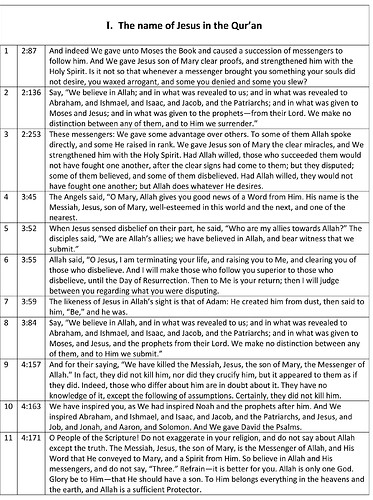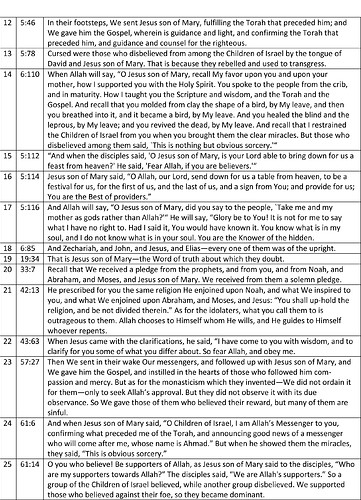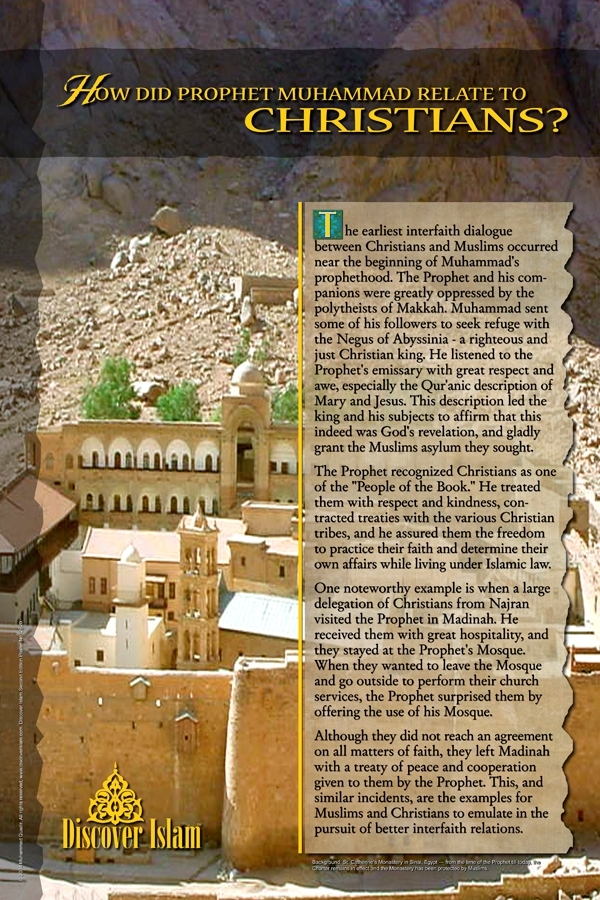I post this thread as a “New Topic” because I missed the deadline for posting in the original thread by about 30 minutes.
I share here every verse in the Qur’an that mentions the name “Jesus”.
In fact, contrary to the incorrect statement that I made in the first “What do you think about Islam” thread, there are other verses that are about Jesus but that do not include the name “Jesus” and, therefore, are not included in the list posted above. For a larger collection, see Jesus in Islam.
The verses that I quoted are from “The Study Quran: A New Translation and Commentary” by an Editorial Board consisting of:
- SEYYED HOSSEIN NASR (Editor-in-Chief), University Professor of Islamic Studies at the George Washington University, is an international authority on Islamic philosophy, mysticism, art, and science as well as comparative religion and religion and ecology.
- CANER K. DAGLI (General Editor), Associate Professor of Religious Studies at the College of the Holy Cross, is a specialist in Sufism, Islamic philosophy, interfaith dialogue, and Quranic studies.
- MARIA MASSI DAKAKE (General Editor) is Associate Professor of Religious Studies at George Mason University, specializing in Shiism, Sufism, Islamic philosophy and theology, the Quran, interfaith dialogue, and issues related to women and the feminine in classical Islam.
- JOSEPH E. B. LUMBARD (General Editor) is Assistant Professor in the Department of Arabic and Translation Studies at the American University of Sharjah and an Associate Editor
for the Integrated Encyclopedia of the Qurʾān (in progress). - MOHAMMED RUSTOM (Assistant Editor), Associate Professor of Islamic Studies at Carleton University, specializes in Sufism, Islamic philosophy and theology, and Quranic exegesis.
- In my post in the original thread, I intended to focus on several specific verses in the list above and add what I believed was relevant and important commentary. As it happens, I didn’t and don’t intend to do so here. But I will say here, that only the most naive and uninformed theist, agnostic, or atheist would try to tell me that Islam’s Allah and Judaism or Christianity’s God are the same, regardless how many Muslim friends and authorities you know who have told you so. And Islam’s ʿĪsā ibn Maryam is most certainly NOT the New Testament’s Jesus.
- I feel it incumbent on me to point out that:
- al-Qurʼān literally means “the recitation”.
- My understanding is that orthodox “Muslims believe that the Quran was orally revealed by God to … Muhammad through the Archangel [Gabriel]] … incrementally over a period of some 23 years, beginning in the month of Ramadan,when Muhammad was 40; and concluding in 632, the year of his death. {The same] Muslims regard the Quran as Muhammad’s most important miracle; a proof of his prophethood and the culmination of a series of divine messages starting with those revealed to Adam, including the … Tawrah (Torah), the … Zabur (Psalms), and the … Injil (Gospel”).
The Quran is thought by [orthodox[ Muslims to be not simply divinely inspired, but the literal word of God. Muhammad did not write it as he did not know how to write. According to tradition, several of Muhammad’s companions served as scribes, recording the revelations. Shortly after the prophet’s death, the Quran was compiled by the companions, who had written down or memorized parts of it. Caliph Uthman established a standard version, now known as the Uthmanic codex, which is generally considered the archetype of the Quran known today. There are, however, variant readings with mostly minor differences in meaning. [Source: “Quran” in Wikipedia.] - I believe that that is why the Arabic version of the Quran is valued more than any translation and why mishandling a copy of it publicly and intentionally can get you hurt.
- Consequently, IMO, it is impossible to avoid the conclusion that Islam theology is “replacement theology”, i.e. Islam is deemed to be a correction and replacement of Christianity, in the same way that orthodox Christianity is deemed to be a correction and replacement of Judaism and in the same manner that Baha’i endeavors to correct and replace Judaism, Christianity, and Islam. “Replacement theology”, or "Supersessionism is common in the history of religion.
- It would seem to me that a person who believes that all religions that proclaim one God are equivalent and and equally true is confused by the differences between the multiple “Gods” that the monotheistic religions proclaim and, in purportedly “harmonizing” any two or more of the monotheistic religions, has manufactured a new religion.


